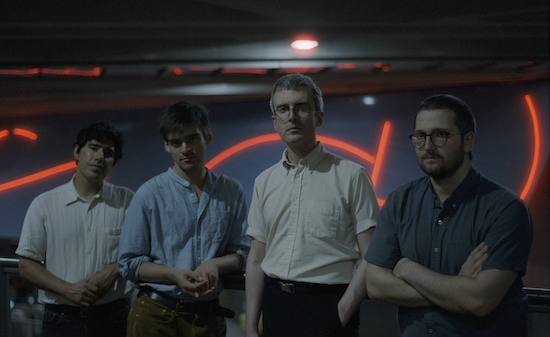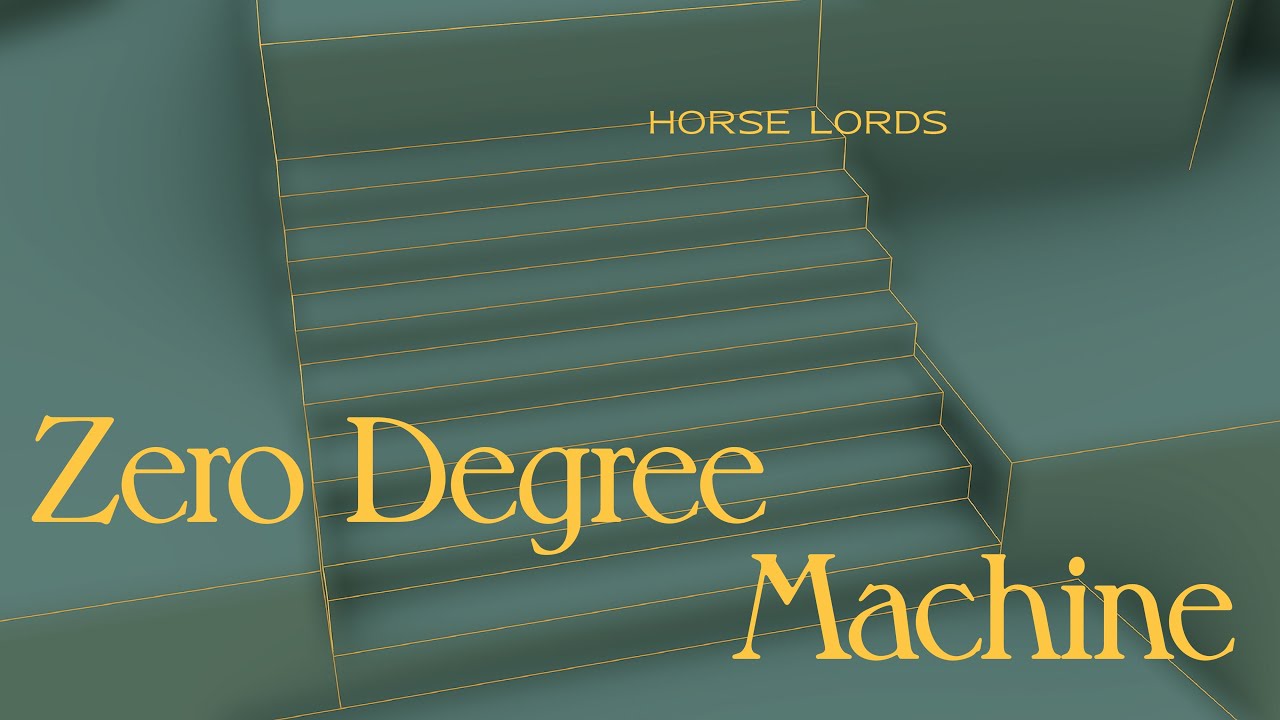Photos by Margaret Rorison
Horse Lords perform as part of Le Guess Who? Festival in Utrecht, Netherlands, which takes place November 10-13. For tickets and full information, here
A lot has changed in the last two years. Three of the four members of Baltimore-born Horse Lords moved to Germany, for one. There were all kinds of different reasons for the move, they say: job opportunities, dreams of living abroad, their fondness for the shows they’d played on the content. The pandemic pushed them into a decision.
“It just made more sense to be in Europe because all our work is here, so it was a lot easier,” says Owen Gardner, Horse Lords’ guitarist. I speak with him and Max Eilbacher, who plays bass and electronics, over Zoom. The pandemic also influenced how they recorded their fifth album Comradely Objects. “There was a lot more pre-planning or things that would come together in the studio rather than live,” he explains. “So there was less reliance on us being able to just constantly practice and compose together.” In the past, they had their routine: each member worked on their part and constructed it live, basing it around how it would work during a live performance. They could then adjust it, go into the studio, layer different parts on, and try new things.
With one member still in the United States, learning to work on ideas remotely will be fruitful for the long-term too. “Comradely Objects was our last time working together as a four-piece all in the same country," Eilbacher says."The pandemic reversed roles and enabled more rehearsing and practising, more than we would normally do pre-pandemic.Instead of having to practise for concerts or get things in order for a tour, we could just have a few months to meet up and hash things out.”
When I first heard Horse Lords’ track ‘Truthers‘ back in 2016, I immediately wanted to learn more and came across this amazing video session, in which they combine minimalism, African polyrhythms and contemporary composition; the multitude of elements was overwhelming. The trance motifs, brilliant and consistent repetitions, felt entirely original, combined with saxophonist and percussionist Andrew Bernstein’s microtonal activities, Gardner’s embrace of instrumental techniques from across Europe and Africa, and Eilbacher and drummer Sam Haberman’s experiments with electronic synthesis within the rhythm section. They can do all of this within one track, and yet it still sounds catchy, especially live. A few months after discovering ‘Truthers’, I saw them perform in my hometown of Gdańsk.
Their latest release at that time was Interventions on which they embraced techniques ranging from Mississippi blues to Ugandan polyrhythms, as well as an academic understanding of shifts in 20th century minimalist composition. Two years ago, they released The Common Task, on which they embraced mathematical structures, dance music, and an algorithmic approach resembling the Orange Milk roster. The foursome have released occasional mixtapes too, their version of Julius Easman’s ‘Stay On It’, for instance, as well as a host of solo records. Bernstein released his project, A Presentation, earlier this year; Eilbacher has recorded for labels such as Ultraviolet Light, Superpang and Mondoj; members have collaborated with Matmos and The Soft Pink Truth too. With each new record together, the foursome once again prove that they can brilliantly put their compositional ideas to life.
Their new album The Comradely Objects is their first to be released by RVNG Intl, and sees them work once more with a strict framework. “We’re a band that just doesn’t operate like ‘we’ll just show up and play it like that’,” says Eilbacher. “When there was improvisation – which there was more of on this record than on any previous record – it was still directed and goal-oriented.” In ‘Law Of Movement,’ you can hear the microtonal inspirations Bernstein embraced on his solo records, which after three minutes, evolve into a krautrock drive. ‘May Brigade’, on the other hand, is a kind of free improv with Gardener’s guitar and Bernstein’s saxophone solos in the foreground. ‘Zero Degree Machine’ recalls the minimalist trance of Interventions.
The latter song’s name comes from the Japanese architecture movement, of which Eilbacher is a fan. ‘Solidarity Avenue’, meanwhile, is the name of a street in street in Nowa Huta, the district of Krakow, Poland, which was established in 1949 as a sort of utopian community. Their names are rooted in the political aspect of architecture; Eilbacher cites Ernst May as an influence, the interwar German architect and city planner whose ideas were exported to the USSR (the track ‘May Brigade’ is named after the slew of Germans who led the construction of 20 Soviet cities in three years) and who was exiled to Africa when the Nazis took power. “As we resettled in Germany he was very much on our minds,” he says. The title of Comradely Objects as a whole alludes to the early Soviet ideas of social artistic production, reimagining people’s relationships with their surroundings.
Although most of the tracks on Comradely Objects were composed with all these specific ideas in mind, there was an exception. ‘Mess Mend’, a track with Gardner playing guitar in a banjo-like style, was originally composed for an opera for The Acme Corporation in Baltimore titled The First Thing That Happens. It was the last thing Horse Lords had worked on before the pandemic. For the opera, the song’s drum part was the main theme, but for the album they repurposed it. “When we first recorded and finished it, it sounded like a psych jammer. We were like ‘I don’t think we really want to present that to the world,’” says Gardner. “So, we thought it through a little more, and we said, ‘What if we transposed some rave onto that?’ Sort of the next phase of psychedelic music that doesn’t really have a lot to do with rock music. We wanted to use that almost macho sound as an undercut and make it more expensive.”

Can Horse Lords be called ‘rock music’? “For all intents and purposes of fitting into genres, categorization, or spectral range, it’s rock music, but I feel very little connection to that,” says Eilbacher. “I don’t relate myself to a traditional bass player in a rock band, and I constantly forget we are a rock band because I don’t really listen to rock music, and I don’t have much interest in rock music.” Horse Lords was more of a rock band when they formed, says Gardner, but even in their early years they had a tension that set them apart. “Certainly, there are a lot of ingredients of early rock and roll that I still very much identify with. I think it’s ultimately a term that is sort of artificial, a catch-all for a lot of different things, like blues, hillbilly music, and electrified folk music.” Eilbacher adds that “the instruments are rock and roll but everything else behind them is… I wouldn’t say we are ‘avoiding’ them but constantly skirting them or playing with that.”
Gardner continues: “I feel like some of the reception is that we take ideas from contemporary music and make them ‘rock,’ which is almost the reverse of how we actually approach it. We’re sort of stuck with rock sounds, or we stuck ourselves with rock sounds. We had to figure out how to make it not just sound like… I don’t mean to sound contemptuous, but that sound that ’feels’ like it’s a rock band.” Comradely Objects is pretty far from that traditional ‘rock band’ style. “There tend to be shorter pieces that play with and blur that line of ‘Is this pop or is this algorithmic composition?’” Eilbacher laughs.
Comradely Objects examines both historical and contemporary efforts to reinvent the object of mass consumption through artistic means, gesturing to the politics that continue to be present in Horse Lords’ music. “We have always been concerned with how to deal with politics without language. The ‘object’ is sort of a different way to think about this,” says Gardner. “This is an idea by Alexander Rodchenko about how liberated people can liberate their objects or imagine a new relationship between people and objects. But how to think once we break the bonds of consumer fetishism? It’s about reimagining our relationships with the things around us as emancipated people. Music is a special case, of course, because it’s not an object, so it can’t involve that much imaginative approach.”
Eilbacher points out that sound can still be an important way in which to renegotiate these relationships. Not having lyrics can be an advantage too: the band do not have to write anything on the nose or ridiculous. Music is just an object that acts as a nexus for the centre point of their communication with others. Gardner remarks that sound is a sort of abstract vector for this kind of expression, forcing more imagination. “We’re thinking about a new way to listen and forcing this kind of listening that’s more engaged with form and the abstract aspect of it, the experience of music. It puts people in the role of participants rather than just passive observers. It’s like we’re building this together.”
Comradely Objects will be released on Nobember 4, followed by an extensive tour including an appearance at Le Guess Who? While recording, however, the band weren’t concerned about translating it to the stage. “We were in the studio, and we had a lot of moments during some crazy overdubs and alignments, of being like ‘oh, how are we going to do this live?’ But it was never a concern, we were like, ‘we’ll figure it out.’ We wanted to play it enough times to record it, but now we must relearn it and learn how to play it live,” Eilbacher explains.

Adds Gardner, “Just because I’m playing something, this doesn’t mean it’s gonna end up in the final product, so you could indulge more, be more willing to make mistakes and take risks that maybe you wouldn’t take otherwise. By being more thoughtful in one way and less thoughtful in another – hopefully a healthy way of being less thoughtful – we’re just being less concerned about playing something correctly.” This could be understood in terms of timbre and sound palettes – on the album there is a lot of expansion, new kinds of electronic instruments and overdubs. The band has been working together for so long that it’s clear what is and what is not going to work compositionally.
“When you’re performing live, it’s very much about a dialogue with an audience. When the audience is not present, it becomes a dialogue with technology,” says Gardner. “Because of the way we approached this record, we made something work that maybe normally would not, because we’re not as accountable to a live audience. Now, we have to figure out how to renew that relationship.”
Horse Lords’ new album Comradely Objects is released on November 4 via RVNG intl. They perform as part of Le Guess Who? Festival in Utrecht, Netherlands, which takes place November 10-13. For tickets and full information, here



